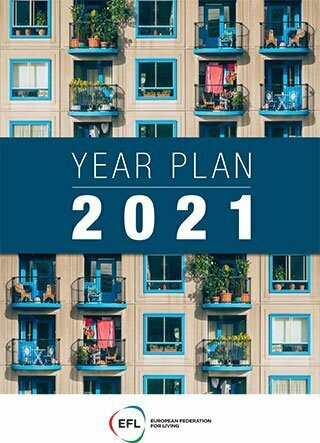News

The year 2020 brought with it unexpected shocks. Until the beginning of March, all was still normal. Then, completely out of the blue, the whole world changed. COVID-19 was among us and things came to a standstill. Countries closed their borders, imposed lockdowns and the streets of once bustling cities and towns became empty. Slowly, as June came around, the most severe measures were lifted. EFL reacted immediately. The new reality was – and still is – digital and we adapted our complete service provision to this. We introduced MS Teams as a major communication tool and started redeveloping our website to keep up with the “new normal”. Physical meetings were cancelled, webinars replaced topic group meetings and we examined the effects of the COVID-19 crisis on our members via several surveys and (online) events.
EFL Year Plan 2021
In the EFL Year Plan 2021, we look ahead and plan for the future in the full knowledge that many things are still uncertain. We still don’t know if life will ever return to how it was before. Nevertheless, we assume that post-COVID-19, we will return to a world where physical meetings, education courses and conferences will once again be organised. Until then, we have to take into account that there is a certain level of uncertainty around whether all of our 2021 plans will come to fruition.
Stronger Focus on Projects, Outputs and Funding
The ambitions of EFL are by principle based on the aims of the members and associates themselves. Every two years, we perform a member survey, through which we gain more knowledge about what our members want to get out of their EFL membership. From this, we create a long-term strategy to respond to the goals of our members. The output of this member survey is also discussed during the EFL co-creation days and later on at the General Assembly.
The member community is highly interested in EFL developing from a network mainly focused on exchange and peer-learning, to one that also functions as a co-producer of products and services with concrete outputs. These co-creation days formed a perfect platform to launch new ideas, mainly delivered by the members themselves, and the transition from ideas into concrete projects. As a cooperation-based network, we managed to form early project teams, who were able to define goals and output for the most feasible projects.
Extending Partnerships with Public-Sector Institutions and Non-Profits
In terms of the strategic orientation of EFL, the members expressed a desire for EFL to develop partnerships with public-sector organisations, not just those from the academic or private sector. Many of our members are active in urban development and cooperate with city authorities, care institutions and other organisations in the public-sector. We have, therefore, set a new goal to tighten links with these type of organisations and add a new category of associated partners: “Public Bodies and Non-Profit Organisations”. Within this category, we offer municipalities (or municipal housing departments), philanthropic organisations, non-profit networks and other relevant non-profits in the value chain of housing the opportunity to join the EFL network. In 2020, the first applications within this category have already been received and we are in the process of onboarding these new public sector members.
